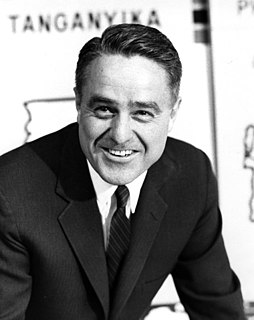A Quote by Pope Francis
The Book of Genesis tells us that God created man and woman entrusting them with the task of filling the earth and subduing it, which does not mean exploiting it but nurturing and protecting it, caring for it through their work.
Related Quotes
When we talk about the environment, about creation, my thoughts turn to the first pages of the Bible, the Book of Genesis, which states that God placed man and woman on earth to cultivate and care for it. And the question comes to my mind: What does cultivating and caring for the earth mean? Are we truly cultivating and caring for creation? Or are we exploiting and neglecting it?
The vocation of being a 'protector' [. . .] means protecting all creation, the beauty of the created world, as the Book of Genesis tells us and as Saint Francis of Assisi showed us [. . .] In the end, everything has been entrusted to our protection, and all of us are responsible for it. Be protectors of God’s gifts!
The very beginning of Genesis tells us that God created man in order to give him dominion over fish and fowl and all creatures. Of course, Genesis was written by a man, not a horse. There is no certainty that God actually did grant man dominion over other creatures. What seems more likely, in fact, is that man invented God to sanctify the dominion that he usurped for himself over the cow and the horse.
When it comes to the whole debate today over evolution versus creation, Jesus affirmed the early chapters of Genesis were accurate when He said, "Have you not read, that He who created them from the beginning made them male and female" (Matthew 19:4). Adam and Eve didn't come on the scene after billions of years of mutations and evolution. No. God created them all the way back in the beginning-just like Moses reported in the Book of Genesis.
The cure is care. Caring for others is the practice of peace. Caring becomes as important as curing. Caring produces the cure, not the reverse. Caring about nuclear war and its victims is the beginning of a cure for our obsession with war. Peace does not comes through strength. Quite the opposite: Strength comes through peace. The practices of peace strengthen us for every vicissitude. . . . The task is immense!
The problem of reconciling human suffering with the existence of a God who loves, is only insoluble so long as we attach a trivial meaning to the word "love", and look on things as if man were the centre of them. Man is not the centre. God does not exist for the sake of man. Man does not exist for his own sake. "Thou hast created all things, and for thy pleasure they are and were created." We were made not primarily that we may love God (though we were made for that too) but that God may love us, that we may become objects in which the divine love may rest "well pleased".
Will you teach your children what we have taught our children? That the earth is our mother? What befalls the earth befalls all the sons of the earth. This we know: the earth does not belong to man, man belongs to the earth. All things are connected like the blood that unites us all. Man did not weave the web of life, he is merely a strand in it. Whatever he does to the web, he does to himself. One thing we know: our god is also your god. The earth is precious to him and to harm the earth is to heap contempt on its creator.
The soul of the just man is but a paradise, in which, God tells us, He takes His delight. What do you imagine, must that dwelling be in which a King so mighty, so wise, and so pure, containing in Himself all good, can delight to rest? Nothing can be compared to the great beauty and capabilities of a soul; however keen our intellects may be, they are as unable to comprehend them as to comprehend God, for, as He told us, He created us in his own image and likeness.
The story of the gospel is so much better than the legal model suggests. It tells us that we are created as God's partners, not God's enemies. Sin does a lot of damage to that partnership - it disables us, it discourages us, it disturbs us - but it never destroys the bond that exists between God and humanity.
Woman is God’s supreme creation. Only after the earth had been formed, after the day had been separated from the night, after the waters had been divided from the land, after vegetation and animal life had been created, and after man had been placed on the earth, was woman created; and only then was the work pronounced complete and good.

































